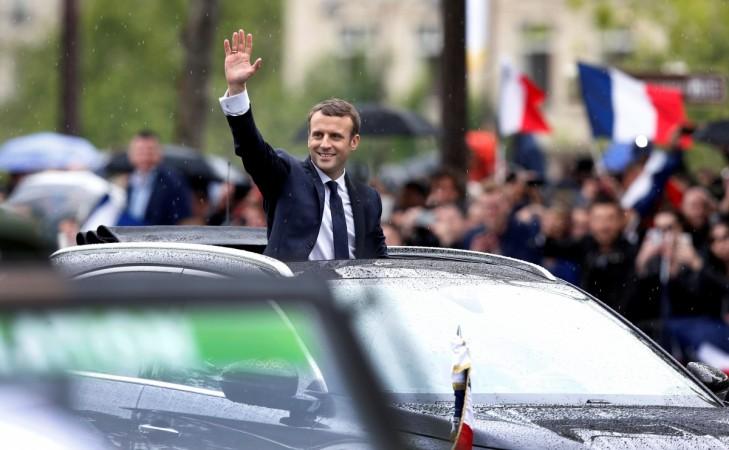
Emmanuel Macron was sworn in as the President of France on Sunday making him the youngest ever to be elected to the post at 39 years of age. He took over from Socialist Francois Hollande in a ceremony at the Elysee Palace in central Paris amid tight security on Sunday.
Macron arrived at the Elysee Palace in a motorcade and then walked down the red carpet to be greeted by former president Hollande for his inauguration, AFP reported. Macron's wife Brigitte arrived for the ceremony separately wearing a light blue outfit from Louis Vuitton. Around 1,500 policemen were deployed near the presidential palace and the Champs Elysees avenue. Several roads were also blocked for the swearing-in ceremony.
A 21-gun salute was given from the Invalides military hospital located on the other side of the River Seine once the formalities are over. Macron then headed to the Arc de Triomphe for the wreath-laying ceremony at the tomb of the unknown soldier. Macron, after a formal lunch, also made a traditional stop at the Town Hall in Paris.

Macron will soon have a meeting with Hollande in private during which he will be given the codes through which he can launch the country's nuclear weapons. The new French president will also attend a ceremony in which the official results of the elections will be read out in the presence of hundreds of politicians and invited guests.
Macron faces several challenges including fighting terrorism, high unemployment and uniting a divided country. Hollande, who faced a slow-moving economy and several terror attacks during his term, was the one to launch Macron's political career. Macron was an investment banker before Hollande appointed him as his advisor and then his economy minister.
Macron is likely to reveal the name of his prime minister on Monday following which he will fly to Berlin to meet German Chancellor Angela Merkel. French leaders usually make their first European trip to meet the leader of the other half of the so-called "motor" of the European Union, AFP reported.

Macron will face the "third round of the presidential election" in June when France will elect a new Parliament in a two-round vote. He requires an outright majority so that he is able to implement his reform agenda.
Macron's political movement "Republique en Marche" (Republic on the Move) is likely to field candidates in every constituency in France. This week, it revealed the names of 428 of the 577 candidates saying that it wanted to introduce fresh faces into the National Assembly, also known as the lower house of parliament.


!['Kaise ho bhai..': PM Modi shook hands with Akshay Kumar at a media summit in Delhi [Watch] 'Kaise ho bhai..': PM Modi shook hands with Akshay Kumar at a media summit in Delhi [Watch]](https://data1.ibtimes.co.in/en/full/806317/kaise-ho-bhai-pm-modi-shook-hands-akshay-kumar-media-summit-delhi-watch.jpg?w=220&h=135&l=50&t=40)


!['Kaise ho bhai..': PM Modi shook hands with Akshay Kumar at a media summit in Delhi [Watch]](https://data1.ibtimes.co.in/en/full/806317/kaise-ho-bhai-pm-modi-shook-hands-akshay-kumar-media-summit-delhi-watch.jpg?w=220&h=138)



!['Kaise ho bhai..': PM Modi shook hands with Akshay Kumar at a media summit in Delhi [Watch]](https://data1.ibtimes.co.in/en/full/806317/kaise-ho-bhai-pm-modi-shook-hands-akshay-kumar-media-summit-delhi-watch.jpg?w=220&h=135)


